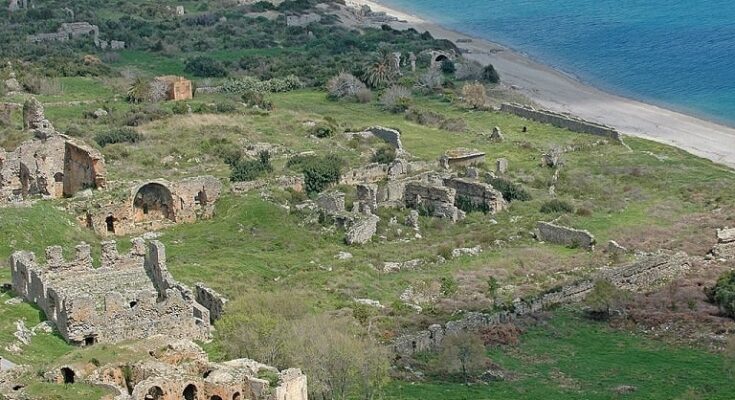
A rare inscription in ancient Greek language discovered at the ruins of the Hellenistic Age city of Anemurium in southern Turkey, was revealed by experts to be a dedication to a local champion wrestler.
The inscription consists of 13 lines and is carved a piece of stone 120 centimeters high and 50 centimeters wide, which is believed to be the base of a statue in honor of the local athlete Kaikilianos.
“The inscription excited us. We know that inscriptions belonging to athletes are found in other cities, but this is the first time we find a solid inscription consisting of 13 lines on an archaeological material that we can call an altar or a statue base,” Professor Dr. Mehmet Tekocak of Selçuk University, director of the excavation, told Turkey’s Anadolu news agency.
Ancient Greek dedication inscribed on base of a statue
According to Dr Tekocak, the Greek inscription with the dedication to champion wrestler Kaikilianos was unearthed from the remains of the ancient city’s public baths and dates back to the Roman era of Anemurium, when it was a flourishing harbour.
The professor notes that the inscription includes the names of the person who organized the competition, the person who received the award, as well as the category in which the competition was held.
“A citizen named Flavianus, who lived in the ancient city of Anemurium in the 2nd century AD, organized a competition in his name every 5 years. From the inscription, we learn that an athlete named Kaikilianos became the champion in the adult category in the wrestling competition held for the 2nd time and that Flavianus gave him an award,” Dr Tekocak describes.
In addition to the award, an honorary statue and inscription were prepared for the athlete.
“There should most likely be a statue of the athlete on this inscription. The fact that the inscription was located in the public bath house, which was an active point of social and cultural life in ancient times, shows that the athlete was a very important person,” the archaeology professor explains.
Among other important finds unearthed at Anemurium was the statue of a woman in last year’s excavation.
Ancient city of Anemurium to apply for UNESCO World Heritage Site status
This is the 7th excavation period at Anemurium, which is located near the modern city of Anamur, in Turkey’s southern province of Mersin.
Its history goes back in time to at least the Hellenistic era, as proven by archaeological finds. It is believed that the city was inhabited until the 7th century AD.

The ancient remains cover a vast area and include an acropolis as well as a lower town and a necropolis with a multitude of monumental constructions.
Among the most important finds are a large open-air theatre, a small covered odeon, three large and one small public baths and four early Christian churches.
Many of the surviving buildings features mosaics on their walls and floors.
In June, Governor Ali Hamza Pehlivan announced that a dossier was being prepared to nominate Anemurium for inclusion in UNESCO’s World Heritage List.
Pehlivan believes that the discovery of the inscription featuring this rare dedication to an ancient athlete, will boost Anemurium’s chances to succeed.
“These inscriptions and artifacts will contribute to the historical structure being included in the list,” he told Anadolu.



